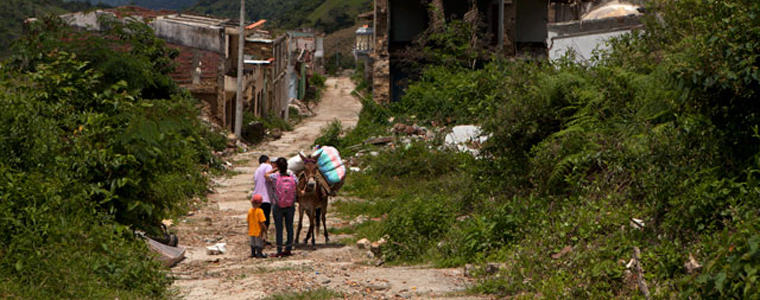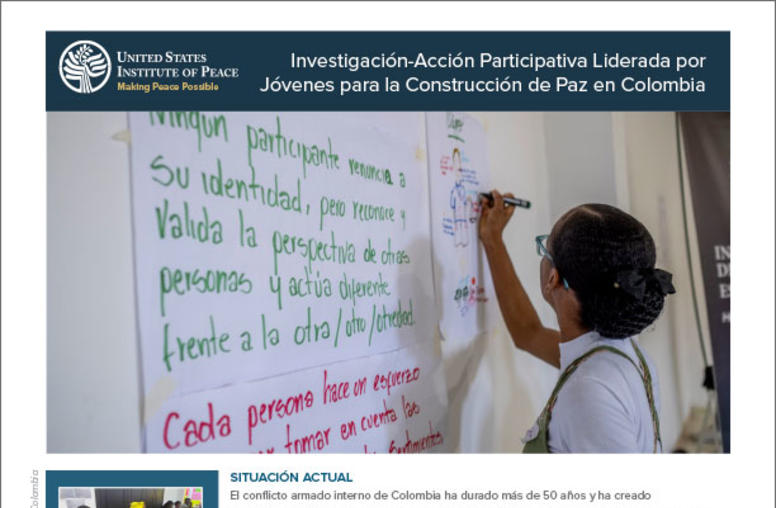25th Anniversary of Esquipulas II: Lessons for Peace in Colombia?
August 2012 marks 25 years since the signing of the Esquipulas II agreement in Guatemala that brought an end to the wars of Central America. USIP's senior program officer for Latin America, Virginia Bouvier, explores what lessons Esquipulas II might offer for peace in Colombia.

August 2012 marks 25 years since the signing of the Esquipulas II agreement in Guatemala that brought an end to the wars of Central America. On August 15, 2012, I attended an event at OAS headquarters sponsored by the Organization of American States, the Center for International Policy and the Inter-American Dialogue that commemorated the anniversary.
Many of the principals from the time – including Oscar Arias, Costa Rica’s former president and Nobel Peace Prize laureate; Vinicio Cerezo, Guatemala’s former president; Eduardo Stein, former Guatemalan vice president and ex-minister of Foreign Relations; and Michael Barnes, former chair of the U.S. House Western Hemisphere Affairs Subcommittee – spoke at the event. Cynthia Arnson of the Woodrow Wilson Center, Michael Shifter of the Inter-American Dialogue, and Nicaragua’s former Ambassador Arturo Cruz of the Instituto Centroamericano de Administración de Empresas (INCAE) also provided commentary, as did many OAS, government and diplomatic luminaries in the audience.
The speakers each had their own version of how Esquipulas II came to pass, its significance for the region, and its lessons for Central America today. All agreed that – building on the work of Contadora, the Rio Group, and Esquipulas I – Esquipulas II was a watershed event that gave a final push to the Central American region from war to peace. All spoke of the work still left to be done. President Cerezo called for a new social contract – an Esquipulas III – that would move the region toward greater social inclusion and equity. President Arias observed that, “In Central America, we have peace, democracy, and development, but we lack quality in each of these.”
Many spoke of the crisis facing youth, who make up 70 percent of the population of Central America. Cynthia Arnson noted that the proliferation of gangs in the region has gone hand-in-hand with the lack of opportunities for young people.
Ingredients for Success
Despite the unfinished peace agendas remaining in Central America, I can’t help but think about the lessons Esquipulas II might offer for peace in Colombia. What were the key ingredients that contributed to the successes of Esquipulas II? Many elements come to mind: Leadership. Vision. Political will. Patience. Persistence. Willingness to dialogue with the so-called “enemy” and build confidence between the parties. A clear road map from within the region. Mutual commitments to a process – what Cerezo called a “camino previo” – that allowed a regional and domestic consensus favoring a political solution to be built over time. International backing and engagement by the U.N., OAS, and others to reinforce the call for peace and support implementation of a peace plan.
Other factors also mattered that were not addressed by the speakers. Transnational civil society engagement for peace, including lobbying efforts in the United States by churches, academics, and NGOs, were critical to shifting U.S. policy. Educators, health workers, unionists, lawyers, journalists, artists, and war veterans, among others, contributed to peace efforts within their own sectors. Military and business calculuses came to favor peace.
Despite some differences in the nature of the conflicts, these ingredients seem relevant for Colombia’s recipe for peace. President Cerezo noted the courage it took to promote a political solution when a military path was being pursued. Speakers affirmed the urgency of regional approaches and solutions both then and now. Likewise in Colombia.
President Santos’s announcement on August 27 that his administration has been engaging in exploratory talks in Havana, Cuba, with the FARC guerrillas, and that agreement has been reached to initiate formal peace talks is welcome news. This is just the kind of political will and leadership required for the difficult road to peace. As President Santos considers the lessons from Colombia’s rich repertoire of peace initiatives, perhaps the Esquipulas II will also offer some lessons.


